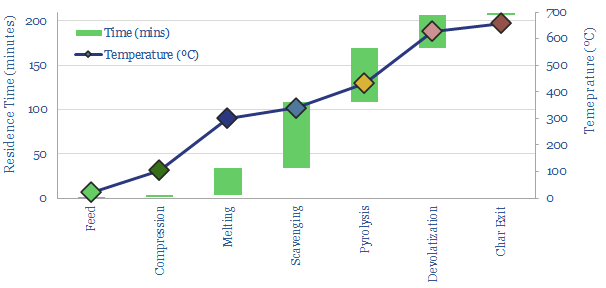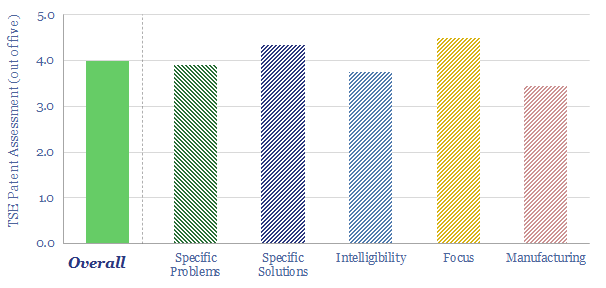Alterra Energy built the US’s first larger-scale plastic pyrolysis facility, in Akron, Ohio, and has steadily been refining its plastic recycling technology. The company recently signed license agreements with Neste and Freepoint. Alterra’s technology is a continuous plastic pyrolysis reactor, with seven discrete stages, using scavengers to remove contaminants, and patented hardware to minimize fouling and devolatilize chars.
Alterra Energy is a private company, headquartered in Ohio, which has been developing thermochemical plastic recycling technology since at least 2009.
The company built the US’s first larger-scale plastic pyrolysis plant in Akron, Ohio, at 60Tpd (23kTpa), starting up in 2017, stress-tested in 2018-19, and fully commissioned in 2020, converting 65-75% of hard-to-recycle mixed plastic waste into 115kbbls of oil fractions (PyOil), chemical feedstocks and waxes.
Alterra now aims to license its plastic recycling technology to large international companies, to generate licensing fees and revenues.
Plastic pyrolysis is a thematically exciting space, which we have been following since the early days of Thunder Said Energy in 2018 (note here), eliminating landfilling of hard-to-recycle plastics and denting long-term oil demand by multi-Mbpd.
However, progressing this chemical technology to commercial scale has been challenging (note here). Two thirds of the companies in next-generation plastic recycling have encountered setbacks or slow progress. And most recently, a select few leaders have risen to the top of our screen. Alterra is amongst them.
Neste Energy has now trialled the technology in Finland and plans to build plants at Vlissingen, Netherlands (55kTpa) and Porvoo, Finland, early steps in a plan to process 1MTpa of plastic waste from 2030 onwards (press release here).
Freepoint Eco-Systems also selected Alterra technology for a 192kTpa advanced recycling facility on the US Gulf Coast, in February-2023, with the output expected to be sold on to Shell (press release here).
Hence we have reviewed Alterra’s technology. Based on the patents, we can pinpoint five challenges in the plastic recycling industry, which Alterra aims to overcome.
Alterra’s patents cover a continuous process, with seven distinct stages (chart below), each with optimized reaction temperatures and residence times. Scavengers are added at the feed stage to remove impurities. And specific hardware is also discussed for mitigating fouling and de-volatilizing char. Good details are given in the patents.

Our observations on Alterra’s technology are covered in the data file. For example, heavy uses of scavengers may add costs above those considered in our simple plastic pyrolysis economic model. However, five years on from first looking at this technology, we also see increasing value in reliability, uptime and the ability to operate robustly.
